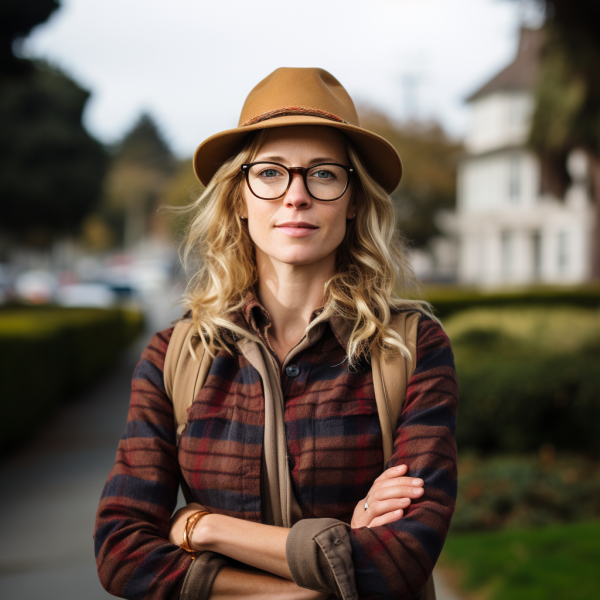Q&A: Jenny Odell on how Bay Area landscapes inspired her new book ‘Saving Time’

From I-880 to Pescadero State Beach, Odell dissects different ways of grokking time.
Jenny Odell, an Oakland author, artist, and former Stanford instructor, is perhaps best known for her 2019 best seller, “How to Do Nothing: Resisting the Attention Economy,” which was named one of the year’s best books by Time, The New Yorker, NPR, and others.
“Saving Time: Discovering a Life Beyond the Clock” (Random House, $29) is her most recent book, and it delivers its messages through a series of Bay Area road trip vignettes peppered with historical, contemporary, and pop culture references. She traces how we came to think of time as money, from Aristotle to Netflix’s “I Think You Should Leave,” and how to find new ways of experiencing time — and what’s at stake if we don’t.
Q: You speak so intimately about the Bay Area, describing how different landscapes tell different stories about time — from geologic time to the I-880 commute. What impact did those landscapes have on you?
A: It has a long history for me. I grew up on the outskirts of Cupertino and San Jose, and I was always struck by the disparity between how time and life felt in the suburbs or at school – even before iPhones, we were all overworked and overscheduled – and in the mountains, such as at Sanborn Park. The passage of time felt very different there.
Q: The time-is-money mentality shapes so much of our thinking about labor and technology. What do you think will happen in, say, Silicon Valley?
A: Many of the interfaces I discuss are designed in Silicon Valley. If you’ve ever ridden in the back of a Lyft or an Uber, you get a sense of the driver’s schedule and how their time is manipulated.
Culturally, Silicon Valley is also a hub for the productivity bros I mentioned earlier, who distribute videos and content. People obviously want to better themselves, and I don’t see anything wrong with that. However, there is a pathological version in which the quantified self has gone too far, where every minute must be as productive as possible, to the point where you lose sight of what it is that gives meaning to your life.
Q: How would that mindset differ in an ideal world?
A: The most fundamental step is to abandon the notion that everyone has 24 hours in a day. Everyone’s experience of time is heavily influenced by their level of power.
A woman who runs a Facebook group for working moms is an example. She’s been thinking about gathering six other moms and having each of them cook dinner for everyone else one night a week. I’d like to see more recognition of how intertwined we all are in our experience of time, and how we can work together to free up more time for everyone.
Q: You discuss different ways marginalized communities experience time in your book. What are some key points?
A: A person’s sense of time pressure or scarcity may not be as simple as not having enough hours in the day. It could be something as simple as being on call, working on someone else’s time, or doing all of the housework and caring for the children. The more I researched the book, the more time appeared to be a reflection of power.
Q: How does this differ from the concept of chosen busyness and productivity culture?
A: Making that distinction can be extremely difficult. There is a significant difference between someone who is working on someone else’s time and someone who is making their own. In the middle, there is also a gray area. Consider an adjunct arts professor who must not only teach but also create artwork, exhibit, and appear busy in order to be hired. I still have many thoughts about my Stanford students. “You should slow down,” you could tell them, but they still felt so much pressure. The fear that you will fall behind is real.
Q: Did you consider climate change while writing “Saving Time”?
A: The book was inspired by two major factors: the observation of time pressure and scarcity, and the feeling of declinism — the need to find some kind of alternative way of thinking about time.
Observing the agency of the nonhuman world has provided me with a lot of inspiration. It begins to appear less like we are this horrible parasitic species living on this planet and essentially alone, and more like both we and the world in which we live are involved in something.
A: Taking a step back, I hope that people become more aware of the signs of time that surround them. I want the person who is under time constraints and has heard phrases like “You just need to work harder” to find relief and stop blaming themselves.
The writer’s strike has inspired me. People were having isolated individual pressure experiences in which they believed the problem was with themselves. Then they all started talking to each other, and they realized, “Oh, wait — it’s much bigger than any of us, and the only way we’re going to move the needle on this is if everyone does this together.”
Meet the writer: Odell will perform at Oaklandside’s Culture Makers event ($15-$18, Eventbrite) on Sept. 21 at 6:30 p.m. at Oakland’s New Parkway Theater, 474 24th St. Hear Odell and geologist Andrew Alden speak about rocks, clocks, and more on Sept. 26 at 6 p.m. at the Oakland Main Library, 125 14th St.; https://oaklandlibrary.bibliocommons.com/.




